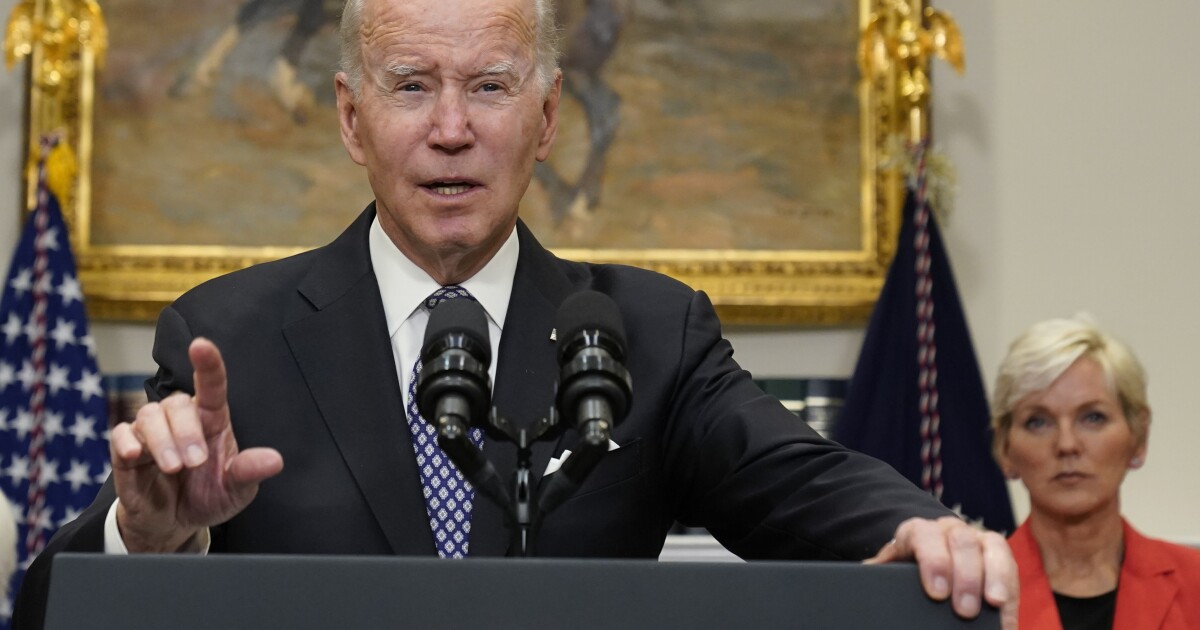

President Joe Biden is renewing his war on Big Oil with the midterm elections less than a week away.
Reacting to stubbornly high gas prices and public concerns about the economy
, Biden called for major oil and gas companies to voluntarily lower their prices or face a windfall profits tax the president would negotiate with Congress
.
BIDEN CLAIMS REPUBLICANS WILL CUT SOCIAL SECURITY AND MEDICARE. WILL THEY?
“Oil companies made billions in profits this quarter,” Biden tweeted on Saturday. “They’re using these record profits to pay out their wealthy shareholders instead of investing in production and lowering costs for Americans. It’s unacceptable. It’s time for these companies to bring down prices at the pump.”
On Monday, he made an announcement alluding to the war in Ukraine and an ethical responsibility the companies have to lower prices.
“Their profits are a windfall of war,” Biden said. “It’s time for these companies to stop their war profiteering.”
ExxonMobil earned a record $19.7 billion in the third quarter of 2022. Chevron’s and Shell’s earnings were slightly down from the second quarter but reached $11.2 billion and $9.5 billion, respectively.
Biden has been calling for gas companies and even individual gas stations to lower prices for months, saying in June that Exxon made ”
more money than God this year.”
Biden’s moves and public statements are part of a wider effort for Democrats to talk more aggressively about the economy as Election Day approaches.
Polls show that more voters trust Republicans than Democrats to straighten out the wobbly economy, which is hampered by 8.2% inflation and sluggish gross domestic product growth. They’re also concerned about high energy costs.
A Trafalgar Group poll found that 54.4% of voters say rising gas prices will make them more likely to vote for Republicans, and 55.5% of independents agree.
Biden has drawn down the Strategic Petroleum Reserve in an effort to keep prices low and repeatedly cited “Putin’s price hike” to explain the high costs. However, gas prices were rising well before the invasion, with Biden first tapping the SPR in November of last year.
Republicans have hit back at the president.
“We are the world’s leading producer of oil and gas, and our workers are eager to produce millions of additional barrels of oil per day to lower costs and ensure America’s energy dominance,” said Rep. Cathy McMorris Rodgers (R-WA). “Instead, President Biden continues to turn to OPEC, Russia, Iran, China, and now Venezuela, who are all emboldened because he is shutting down American energy and ceding our global leadership to their corrupt regimes.”
But Democratic strategist Brad Bannon praised Biden’s move.
“This is the kind of populist issue that has wide political appeal,” Bannon said. “Bernie Sanders has been calling for a windfall profits tax forever. It shows that Democrats have to throw caution to the wind and be more populist.”
Bannon points to polling from the League of Conservation Voters that found 80% of respondents supported a windfall tax, arguing it’s time for his party to be more aggressive on the issue.
“The only regret I have is that the president didn’t do it earlier,” he said.
The timing of the move also stood out to Michael McKenna, a Republican energy lobbyist.
“Why wasn’t this proposed 18 months ago?” McKenna said, pointing to the announcement coming just one week from Election Day. “Most Americans are not chumps; they know it’s a campaign stunt.”
McKenna, a White House official during the Trump administration, argues that taxes can only make products more expensive, not less, and that the way to make gas prices lower is for the United States to produce more oil.
“They’re trying to assign oil companies the blame because they don’t want the blame,” he said. “That’s fair. But it’s also craven, it’s corrupt, and it’s political.”
Biden has not laid out specifics for how the tax would work, how high it would be, or under what circumstances it would be implemented. White House press secretary Karine Jean-Pierre did not elaborate when asked for details on Tuesday.
Oil prices have fallen significantly since their peak near $130 per barrel in the immediate aftermath of Russia’s invasion, but they still remain high at about $95 per barrel on the international benchmark.
In 2020 and early 2021, the industry was bludgeoned by demand destruction wrought by the COVID-19 pandemic and has been conservative with new capital expenditures over worries that spending too much will overexpose them whenever oil prices fall.
CLICK HERE TO READ MORE FROM THE WASHINGTON EXAMINER
Once prices at the pump went up, Democrats began promoting the idea of a windfall tax.
Sen. Sheldon Whitehouse (D-RI) and Rep. Ro Khanna (D-CA) proposed one in early March to recoup earnings and rebate them to consumers, and the House even passed a price-gouging bill in May that went nowhere in the Senate.
Getting a similar bill through Congress may become even more difficult to accomplish should the GOP win control of either chamber.






